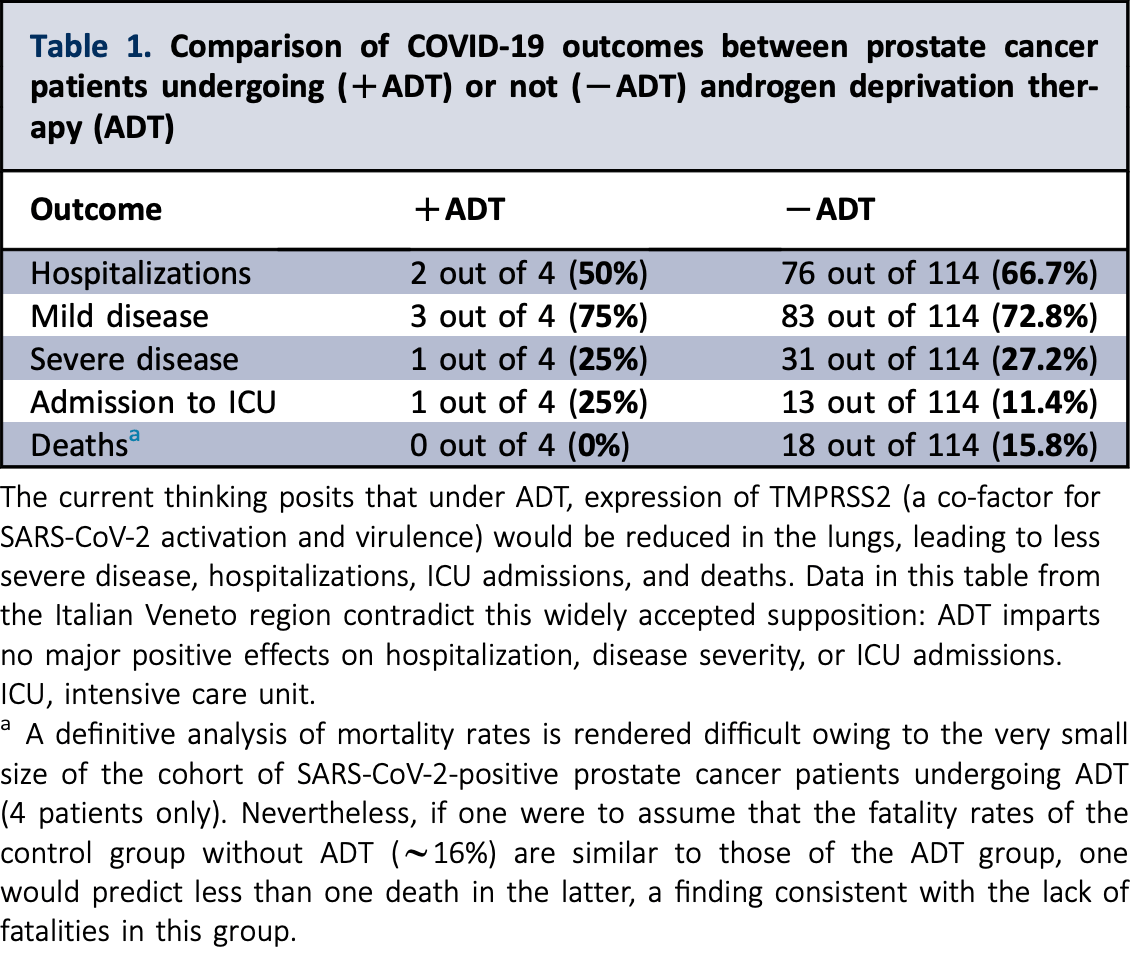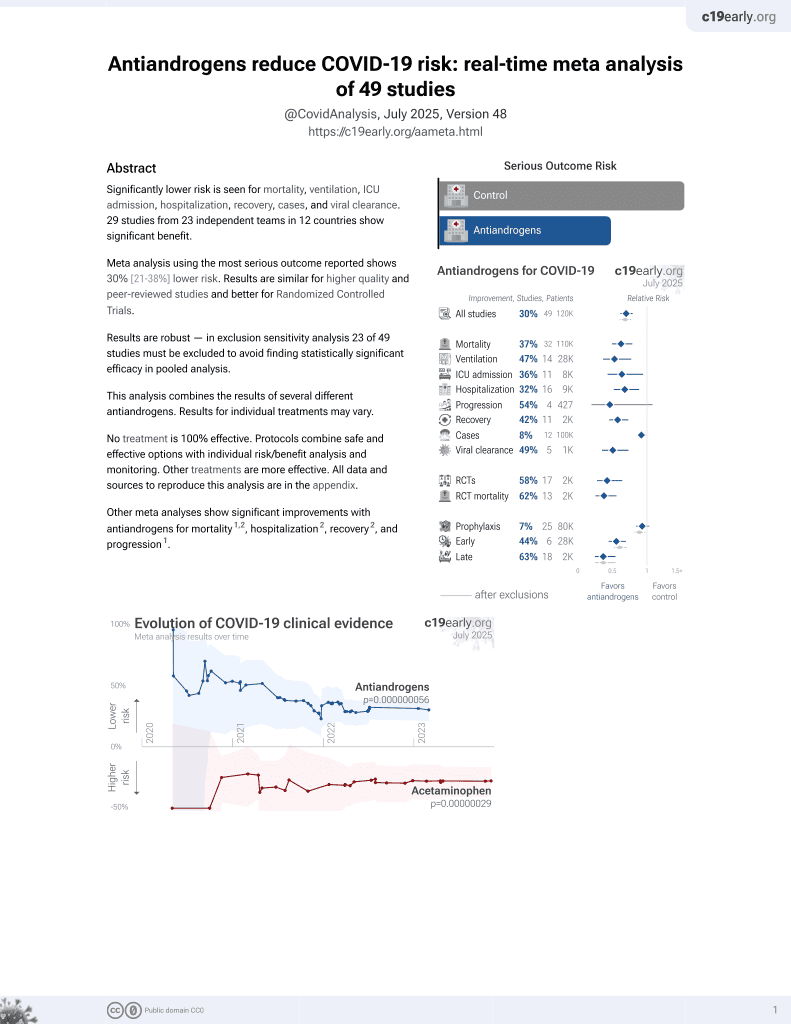
Androgen deprivation therapy may constitute a more effective COVID-19 prophylactic than therapeutic strategy
et al., Annals of Oncology, doi:10.1016/j.annonc.2020.08.2095, Aug 2020
7th treatment shown to reduce risk in
September 2020, now with p = 0.000000056 from 49 studies.
No treatment is 100% effective. Protocols
combine treatments.
6,400+ studies for
210+ treatments. c19early.org
|
Retrospective 118 prostate cancer patients, 4 on androgren deprivation therapy, not showing significant differences (as expected with only 4 patients in the treatment group).
|
risk of death, 94.9% lower, RR 0.05, p = 1.00, treatment 0 of 4 (0.0%), control 18 of 114 (15.8%), NNT 6.3, relative risk is not 0 because of continuity correction due to zero events (with reciprocal of the contrasting arm).
|
|
risk of ICU admission, 119.2% higher, RR 2.19, p = 0.40, treatment 1 of 4 (25.0%), control 13 of 114 (11.4%).
|
|
risk of hospitalization, 25.0% lower, RR 0.75, p = 0.60, treatment 2 of 4 (50.0%), control 76 of 114 (66.7%), NNT 6.0.
|
|
risk of severe case, 8.1% lower, RR 0.92, p = 1.00, treatment 1 of 4 (25.0%), control 31 of 114 (27.2%), NNT 46.
|
| Effect extraction follows pre-specified rules prioritizing more serious outcomes. Submit updates |
Bennani et al., 17 Aug 2020, retrospective, Italy, peer-reviewed, 2 authors.
Abstract: Annals of Oncology
Letters to the Editor
number 176045], Prostate Cancer Foundation [grant number 19CHAL08]; and Italian Association for Cancer Research
Investigator Grant [grant number 22030].
DISCLOSURE
The authors have declared no conflicts of interest.
REFERENCES
1. Delanghe JR, De Buzyere ML, De Bruyne S, Van Criekinge W,
Speeckaert MM. The potential influence of human Y-chromosome
haplogroup on COVID-19 prevalence and mortality. Ann Oncol.
2020;31(11):1582-1584.
2. Jin J-M, Bai P, He W, et al. Gender differences in patients with
COVID-19: focus on severity and mortality. Front Public Health.
2020;8:152.
3. Maan AA, Eales J, Akbarov A, et al. The Y chromosome: a blueprint for
men’s health? Eur J Hum Genet. 2017;25(11):1181-1188.
4. McCoy J, Wambier CG, Vano-Galvan S, et al. Racial variations in COVID19 deaths may be due to androgen receptor genetic variants associated
with prostate cancer and androgenetic alopecia. Are anti-androgens a
potential treatment for COVID-19? J Cosmet Dermatol. 2020;19(7):
1542-1543.
5. Hoffmann M, Kleine-Weber H, Schroeder S, et al. SARS-CoV-2 cell entry
depends on ACE2 and TMPRSS2 and is blocked by a clinically proven
protease inhibitor. Cell. 2020;181(2):271-280.e8.
6. Asselta R, Paraboschi EM, Mantovani A, Duga S. ACE2 and
TMPRSS2 variants and expression as candidates to sex and country
differences in COVID-19 severity in Italy. Aging. 2020;12(11):1008710098.
Androgen deprivation therapy may constitute a
more effective COVID-19 prophylactic than
therapeutic strategy
Cellular transmembrane-serine-protease-2 (TMPRSS2), first
cloned in 1997, has been intermittently the subject of
intensive medical research, starting with the discovery of its
role in recurrent TMPRSS2/ETS fusions and prostate cancer
pathogenesis. TMPRSS2 protein was subsequently shown to
proteolytically activate human respiratory tract viruses
including influenza A, severe acute respiratory syndrome
coronavirus (SARS-CoV), and Middle East respiratory syndrome coronavirus (MERS-CoV). Following the emergence
of SARS-CoV-2 underlying the current coronavirus disease
2019 (COVID-19) pandemic, eyes naturally turned to the
androgen-regulated TMPRSS2 gene for SARS-CoV-2 lung
tropism, mortality rates, and gender bias.
A study by Montopoli et al. in the Annals of Oncology
reported findings congruent with the prevailing notion
that high SARS-CoV-2 infection rates and disease severity
in men may be the result of high androgen-driven
TMPRSS2 expression in the lungs. The authors posit that
since TMPRSS2 is under positive transcriptional control by
the androgen receptor (AR), reduction of TMPRSS2
expression following androgen deprivation therapy (ADT)
in prostate cancer patients would be expected to correlate with reduced SARS-CoV-2 incidence, and in case of
Volume 31
-
Issue 11
-
2020
infection, with lesser disease severity.1 While fewer
prostate cancer patients undergoing ADT contracted the
virus, androgen suppression did not lessen disease
severity (Table 1).
Several findings indicate that TMPRSS2 is unlikely to play
a major role in SARS-CoV-2 lung pathology in men (and
women): first, modulation of SARS-CoV-2 by TMPRSS2 has
so far been observed only in TMPRSS2 protein overexpression experiments and no patient data to this effect
are available. Moreover, while high TMPRSS2 mRNA levels
have been documented in the human lung,2 AR and
TMPRSS2 proteins do not appear to be highly expressed in
the lungs.2,3 This indicates that androgens do not..
DOI record:
{
"DOI": "10.1016/j.annonc.2020.08.2095",
"ISSN": [
"0923-7534"
],
"URL": "http://dx.doi.org/10.1016/j.annonc.2020.08.2095",
"alternative-id": [
"S0923753420421039"
],
"assertion": [
{
"label": "This article is maintained by",
"name": "publisher",
"value": "Elsevier"
},
{
"label": "Article Title",
"name": "articletitle",
"value": "Androgen deprivation therapy may constitute a more effective COVID-19 prophylactic than therapeutic strategy"
},
{
"label": "Journal Title",
"name": "journaltitle",
"value": "Annals of Oncology"
},
{
"label": "CrossRef DOI link to publisher maintained version",
"name": "articlelink",
"value": "https://doi.org/10.1016/j.annonc.2020.08.2095"
},
{
"label": "Content Type",
"name": "content_type",
"value": "simple-article"
},
{
"label": "Copyright",
"name": "copyright",
"value": "© 2020 European Society for Medical Oncology. Published by Elsevier Ltd."
}
],
"author": [
{
"affiliation": [],
"family": "Bennani",
"given": "N.N.",
"sequence": "first"
},
{
"affiliation": [],
"family": "Bennani-Baiti",
"given": "I.M.",
"sequence": "additional"
}
],
"container-title": "Annals of Oncology",
"container-title-short": "Annals of Oncology",
"content-domain": {
"crossmark-restriction": true,
"domain": [
"annalsofoncology.org",
"elsevier.com",
"sciencedirect.com"
]
},
"created": {
"date-parts": [
[
2020,
8,
18
]
],
"date-time": "2020-08-18T06:36:55Z",
"timestamp": 1597732615000
},
"deposited": {
"date-parts": [
[
2023,
10,
5
]
],
"date-time": "2023-10-05T22:26:27Z",
"timestamp": 1696544787000
},
"indexed": {
"date-parts": [
[
2023,
11,
25
]
],
"date-time": "2023-11-25T16:21:18Z",
"timestamp": 1700929278310
},
"is-referenced-by-count": 12,
"issue": "11",
"issued": {
"date-parts": [
[
2020,
11
]
]
},
"journal-issue": {
"issue": "11",
"published-print": {
"date-parts": [
[
2020,
11
]
]
}
},
"language": "en",
"license": [
{
"URL": "https://www.elsevier.com/tdm/userlicense/1.0/",
"content-version": "tdm",
"delay-in-days": 0,
"start": {
"date-parts": [
[
2020,
11,
1
]
],
"date-time": "2020-11-01T00:00:00Z",
"timestamp": 1604188800000
}
},
{
"URL": "http://www.elsevier.com/open-access/userlicense/1.0/",
"content-version": "vor",
"delay-in-days": 365,
"start": {
"date-parts": [
[
2021,
11,
1
]
],
"date-time": "2021-11-01T00:00:00Z",
"timestamp": 1635724800000
}
}
],
"link": [
{
"URL": "https://api.elsevier.com/content/article/PII:S0923753420421039?httpAccept=text/xml",
"content-type": "text/xml",
"content-version": "vor",
"intended-application": "text-mining"
},
{
"URL": "https://api.elsevier.com/content/article/PII:S0923753420421039?httpAccept=text/plain",
"content-type": "text/plain",
"content-version": "vor",
"intended-application": "text-mining"
}
],
"member": "78",
"original-title": [],
"page": "1585-1586",
"prefix": "10.1016",
"published": {
"date-parts": [
[
2020,
11
]
]
},
"published-print": {
"date-parts": [
[
2020,
11
]
]
},
"publisher": "Elsevier BV",
"reference": [
{
"DOI": "10.1016/j.annonc.2020.04.479",
"article-title": "Androgen-deprivation therapies for prostate cancer and risk of infection by SARS-CoV-2: a population-based study (n = 4532)",
"author": "Montopoli",
"doi-asserted-by": "crossref",
"first-page": "1040",
"journal-title": "Ann Oncol",
"key": "10.1016/j.annonc.2020.08.2095_bib1",
"volume": "31",
"year": "2020"
},
{
"article-title": "No evidence that androgen regulation of pulmonary TMPRSS2 explains sex-discordant COVID-19 outcomes",
"author": "Baratchian",
"journal-title": "BioRxiv",
"key": "10.1016/j.annonc.2020.08.2095_bib4",
"year": "2020"
},
{
"DOI": "10.1016/j.mce.2009.12.022",
"article-title": "Androgen receptor and androgen-dependent gene expression in lung",
"author": "Mikkonena",
"doi-asserted-by": "crossref",
"first-page": "14",
"journal-title": "Mol Cell Endocrinol",
"key": "10.1016/j.annonc.2020.08.2095_bib5",
"volume": "317",
"year": "2010"
},
{
"article-title": "TMPRSS2, required for SARS-CoV-2 entry, is downregulated in lung cells by enzalutamide, a prostate cancer therapeutic",
"author": "Leach",
"journal-title": "Research Square",
"key": "10.1016/j.annonc.2020.08.2095_bib6",
"year": "2020"
},
{
"article-title": "What does androgenetic alopecia have to do with COVID-19? An insight into a potential new therapy",
"author": "Goren",
"first-page": "e13365",
"journal-title": "Dermatol Ther",
"key": "10.1016/j.annonc.2020.08.2095_bib7",
"year": "2020"
},
{
"DOI": "10.4049/jimmunol.204.Supp.241.34",
"article-title": "Androgen receptor targeted therapy sensitizes tumor bearing mice to effective immunotherapy",
"author": "Polesso",
"doi-asserted-by": "crossref",
"first-page": "241.34",
"issue": "Suppl 1",
"journal-title": "J Immunol",
"key": "10.1016/j.annonc.2020.08.2095_bib8",
"volume": "204",
"year": "2020"
},
{
"DOI": "10.1073/pnas.1321060111",
"article-title": "Systems analysis of sex differences reveals an immunosuppressive role for testosterone in the response to influenza vaccination",
"author": "Furman",
"doi-asserted-by": "crossref",
"first-page": "869",
"journal-title": "Proc Natl Acad Sci U S A",
"key": "10.1016/j.annonc.2020.08.2095_bib9",
"volume": "111",
"year": "2014"
}
],
"reference-count": 7,
"references-count": 7,
"relation": {},
"resource": {
"primary": {
"URL": "https://linkinghub.elsevier.com/retrieve/pii/S0923753420421039"
}
},
"score": 1,
"short-title": [],
"source": "Crossref",
"subject": [
"Oncology",
"Hematology"
],
"subtitle": [],
"title": "Androgen deprivation therapy may constitute a more effective COVID-19 prophylactic than therapeutic strategy",
"type": "journal-article",
"update-policy": "http://dx.doi.org/10.1016/elsevier_cm_policy",
"volume": "31"
}
